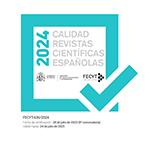The discreet wearing out of bodies and souls at work: Simone Weil on speed, humiliation and slow affliction.
Resumen
The goals of this paper are twofold. First, the paper seeks to show the relevance of French philosopher Simone Weil’s writings on work for contemporary political and social theory. More specifically, by drawing on Weil’s “factory writings”—i.e. the diary she kept during the many months she spent working in factories, and the essays and letters that followed shortly after—the article shows that Weil’s analysis of speed, humiliation and affliction is highly pertinent for reflecting upon the consequences of the increasingly ubiquitous recourse to digital tracking and monitoring tools by today’s employers. Secondly, the paper proposes to read Weil’s account of degradation and affliction in light of the contemporary scholarship on “slow violence”. Inspired by Rob Nixon’s work, this scholarship is interested in forms of harm that are slow-paced, attritional, ‘out of sight’ and intimately tied to our (distracted) attention regimes. As I argue, Weil very lucidly described the paradox at the heart of many types of modern work: namely, that its fast pace causes the slow death of workers’ souls and bodies. Demonstrating the important resonances of Weil’s account of factory life and contemporary suffering in the era of digital surveillance, the paper underlines the significance of Weil’s account of affliction for understanding the depths of the harms caused by these forms of domination.
Descargas
Descarga artículo
Licencia
La revista Logos. Anales del Seminario de Metafísica, para fomentar el intercambio global del conocimiento, facilita el acceso sin restricciones a sus contenidos desde el momento de su publicación en la presente edición electrónica, y por eso es una revista de acceso abierto. Los originales publicados en esta revista son propiedad de la Universidad Complutense de Madrid y es obligatorio citar su procedencia en cualquier reproducción total o parcial. Todos los contenidos se distribuyen bajo una licencia de uso y distribución Creative Commons Reconocimiento 4.0 (CC BY 4.0). Esta circunstancia ha de hacerse constar expresamente de esta forma cuando sea necesario. Puede consultar la versión informativa y el texto legal de la licencia.











